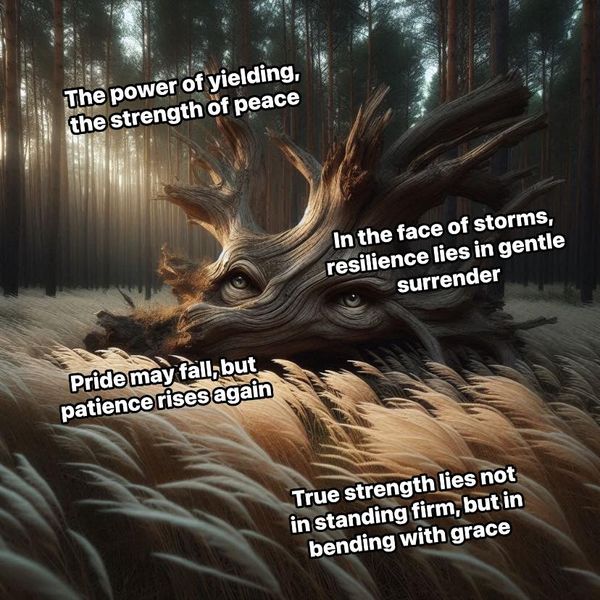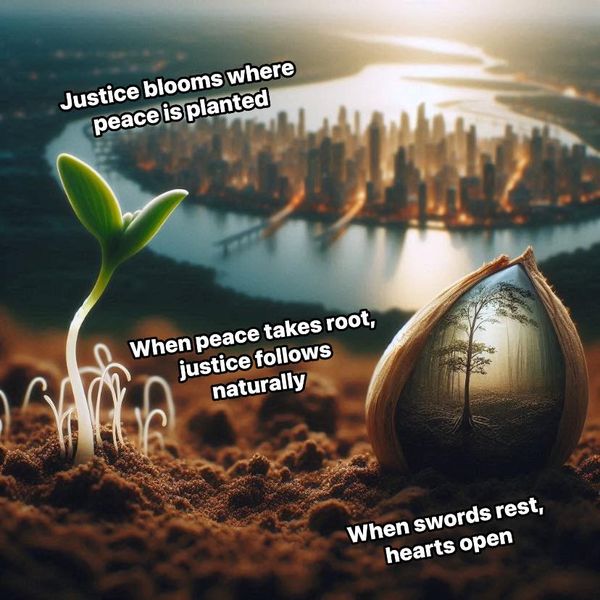
In a land once torn by endless disputes and rivalries, two ancient cities, Ashara and Zalen, stood on either side of a majestic river. Both cities were rich in culture and history, yet they held a long-standing grudge. For centuries, they had fought over the land surrounding the river, each claiming rights to its fertile banks. Despite generations of bloodshed, neither side had truly “won”—they had only accumulated more sorrow, loss, and a legacy of bitterness.
One day, a humble scholar named Sefir from a distant village arrived in Ashara. Known for his wisdom and gentle spirit, he sought permission to speak with the elders of both cities. Intrigued by this unassuming stranger, the elders granted him an audience, though they were skeptical that words could succeed where centuries of war had failed.
Sefir addressed them, saying, “You have tried to claim justice by force, yet here you stand, weary and no closer to resolution than your ancestors. This struggle you face reminds me of a story from the forest—a story of a tree and a storm.”
The elders listened, curious but cautious.
“Long ago,” Sefir began, “there was a mighty oak that stood at the edge of a meadow, towering above the rest. It believed itself invincible, and so, when fierce winds blew, it braced itself with all its strength, refusing to bend. When a storm raged, the oak would resist with pride, convinced that it could endure anything by sheer force.”
“But one day, an unrelenting storm hit the forest. The oak, rigid and unyielding, was uprooted, crashing to the ground. Its strength, powerful though it was, could not outlast the fury of nature.”
Sefir paused, letting the imagery settle before continuing, “Nearby, a field of grass observed the mighty oak’s fall. The grass did not resist the winds; it bent and swayed, allowing nature to take its course. When the storm passed, the grass rose again, unharmed and whole. In yielding to the natural order, it had survived.”
He looked at the elders, his gaze steady. “Justice is like that. It is not achieved by force or anger. Justice comes through peace, through harmony with the natural order. To fight for it as if it were a trophy is to misunderstand its nature. It must be earned, cultivated like a delicate plant that requires patience and care. When one stands in peace, the whole of nature aligns to support them. But when one chooses violence, they find themselves at odds with the natural order, fighting not just their opponents but the world itself.”
The elders were silent, struck by his words. One elder from Ashara finally asked, “But how can we earn this justice, if not by asserting our claim?”
Sefir smiled. “Justice is a fruit, and peace is the soil from which it grows. You cannot force the fruit to appear; you must nurture it by creating the right conditions. Lay down your weapons, cease the quarrels. Let the land rest from your conflicts. Allow peace to guide your actions, and in time, the balance you seek will reveal itself.”
The elders were deeply moved, but the elder of Zalen still hesitated. “We have lost so much already. How can we trust that our enemies will not betray us?”
Sefir placed a hand on his heart. “In peace, you do not need to force your will. You must simply allow it to take root. Just as a seed, once planted, knows how to grow into a tree, so will peace show you the path to justice if you trust in its power. Justice achieved through compassion is lasting, while justice taken by force is fleeting. Peace flourishes only when left undisturbed, as any interference disrupts its natural course.”
In the days that followed, the two cities gradually withdrew their soldiers from the riverbanks. They sent envoys to meet, not as conquerors or defenders, but as neighbors seeking a common future. They agreed to share the river, letting each side benefit from its life-giving waters, and established pathways where citizens of both cities could freely cross, trade, and visit each other’s markets.
The river, once a symbol of division, became a symbol of unity. Over time, the people of Ashara and Zalen found themselves not as rivals, but as friends, as Sefir had said. Through shared festivals, intermarriages, and new alliances, they discovered that they had far more in common than they ever imagined. Their histories intertwined, not through bloodshed, but through stories, friendships, and trust.
Years later, as Sefir traveled through the valley once more, he saw a thriving land where peace had taken root and blossomed into harmony. The people remembered him, and when they greeted him, they did so not as a stranger, but as the wise man who had taught them the power of peace. Sefir’s heart swelled with joy, for he knew that in yielding to the natural order, both cities had achieved not only justice, but a lasting unity that no war could ever produce.
And so, Ashara and Zalen became a single, peaceful realm, guided by the memory of Sefir’s words: that justice is a gift that blooms in the soil of peace, and when we honor the natural order, we are rewarded with a harmony that endures beyond the passing of storms.


